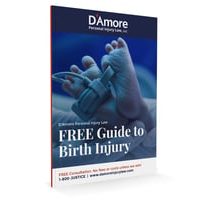What Is Oligohydramnios?
by D’Amore Injury Law | Maryland’s Top-Rated Birth Injury Law Firm
What Is Oligohydramnios?
Oligohydramnios, a condition characterized by an insufficient amount of amniotic fluid surrounding the unborn child, can lead to serious complications. Understanding the nuances of this condition is critical, especially in cases where the condition results from medical malpractice. That’s where the expertise of a dedicated Birth Injury attorney becomes invaluable. Read on to learn more about Oligohydramnios and the role of a medical malpractice lawyer in helping you obtain compensation and justice.
Understanding Oligohydramnios: The Major Types
Oligohydramnios is a condition characterized by a deficiency of amniotic fluid surrounding the fetus in the uterus. Amniotic fluid is crucial as it supports the fetus in development, providing a cushioning effect and facilitating the growth of limbs, muscles, lungs, and the digestive system. The types of Oligohydramnios are generally categorized based on the timing and the underlying cause of the fluid reduction.
The primary types of Oligohydramnios include:
- Chronic Oligohydramnios: This form develops gradually over time and is often associated with placental insufficiency, where the placenta is not able to provide adequate nutrients and oxygen to the fetus, leading to reduced urine output and, consequently, low amniotic fluid.
- Acute Oligohydramnios: A sudden drop in amniotic fluid levels, which can occur due to premature rupture of membranes or some complications with the umbilical cord. It requires immediate medical attention due to the potential rapid impact on the fetus.
- Idiopathic Oligohydramnios:In some cases, the cause of Oligohydramnios is unknown, and this is termed idiopathic. It might be diagnosed when other medical conditions and risk factors have been ruled out.
Oligohydramnios And Medical Malpractice
Medical malpractice may be implicated in cases where Oligohydramnios could have been prevented or mitigated through proper medical care. Below are some ways in which medical malpractice might lead to or exacerbate the condition:
-
Failure to Diagnose: Oligohydramnios can sometimes be detected through routine ultrasounds. If a medical professional fails to recognize the signs of low amniotic fluid or does not conduct regular ultrasounds, this may constitute a failure to diagnose.
-
Inadequate Monitoring: If a mother has known risk factors for Oligohydramnios, such as high blood pressure or diabetes, it is the responsibility of the healthcare provider to monitor her condition closely. Neglecting this duty may lead to a delay in the detection and treatment of Oligohydramnios.
- Improper Treatment: Once diagnosed, Oligohydramnios needs to be managed carefully. If the medical staff does not administer the appropriate treatment, such as amnioinfusion during labor or recommending early delivery when necessary, it could harm the mother and baby.
-
Prescription Errors: Certain medications can increase the risk of developing Oligohydramnios. Prescribing these medications without considering the patient’s full medical history or pregnancy status might be a form of malpractice.
It’s crucial to understand that not all instances of Oligohydramnios are due to medical malpractice. However, if there is a breach in the standard of care that leads to the condition or exacerbates it, and as a result, causes harm to the baby or the mother, there may be grounds for a malpractice claim.
Pursuing a Lawsuit for Oligohydramnios
When Oligohydramnios leads to injury or other serious health concerns for the mother or child and is linked to a lapse in the standard of care, the affected parties may consider filing a lawsuit. To initiate a lawsuit, it is vital to establish that the healthcare provider’s actions deviated from what is widely accepted as the medical community’s standard. This can involve:
- Demonstrating that the healthcare provider had a duty of care to the patient.
- Proving that there was a breach in this duty of care.
- Showing that this breach directly resulted in harm or injury.
It is recommended that families consult with an attorney specializing in medical malpractice and personal injury law to ensure they take the correct steps and file within the relevant statute of limitations.
Maryland Oligohydramnios Attorneys
If you or your loved one has been affected by Oligohydramnios, it’s time to take action. You don’t have to face this challenge alone. Our experienced Birth Injury attorneys at D’Amore Personal Injury Law, LLC, have the expert training, knowledge and skills necessary to handle your complex case. We will get you the compensation and justice you deserve by holding those responsible for your loss accountable. Call (410) 324-2000 or contact us online for more information on how we can assist you.
To learn more about medical malpractice, click here.
Learn more about what to do after a Birth Injury in our FREE guide.
FREE Case Consultation
Fill out the form below and we will contact you.
Or, give us a call at
